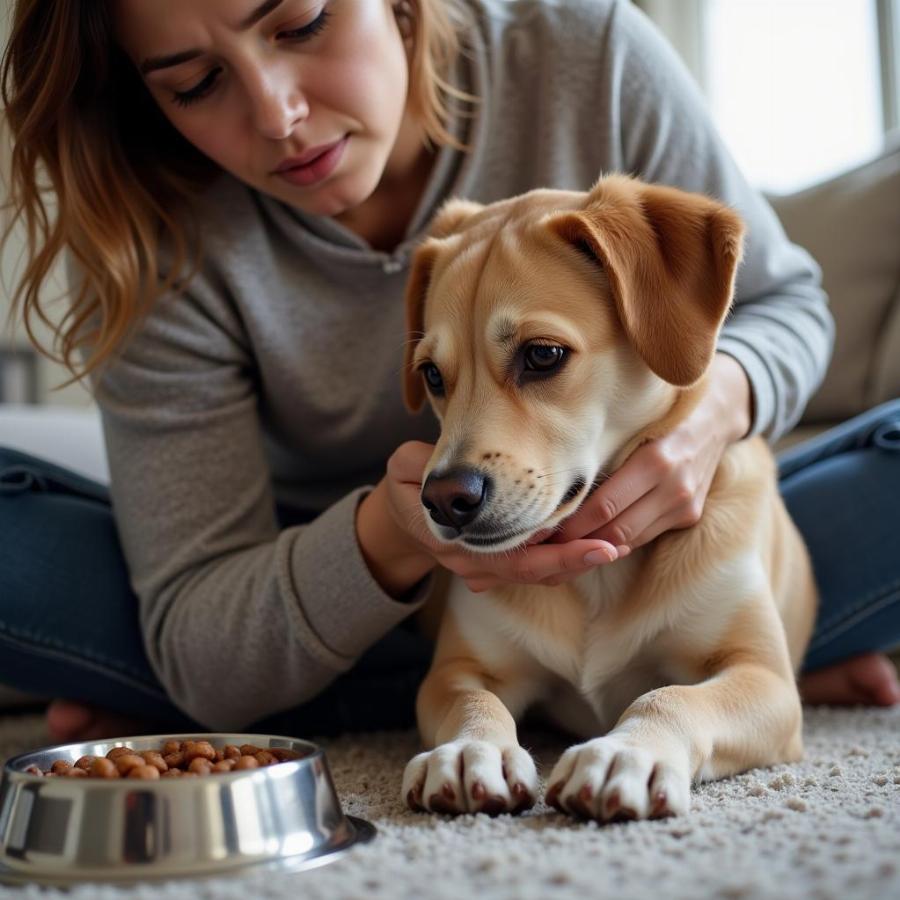Loss of appetite in a 15-year-old dog is a serious concern that requires immediate attention. While it can be a normal part of aging, it can also signal underlying health issues. This article will guide you through the potential causes, diagnostic steps, and ways to encourage your senior dog to eat again.
Understanding Why Your Senior Dog Stopped Eating
There are several reasons why your 15-year-old dog might have stopped eating. Age-related changes, such as decreased sense of smell and taste, can make food less appealing. Dental problems, like gum disease or tooth decay, can make chewing painful. Underlying medical conditions, ranging from kidney disease to cancer, can also suppress appetite. Stress and anxiety, perhaps due to changes in their environment or routine, can also play a role. Finally, cognitive decline, similar to dementia in humans, can affect a dog’s eating habits.
 Senior Dog Loss of Appetite: A worried owner comforting their senior dog who has stopped eating.
Senior Dog Loss of Appetite: A worried owner comforting their senior dog who has stopped eating.
When to Seek Veterinary Care
If your 15-year-old dog has completely stopped eating for more than 24 hours, it’s crucial to consult a veterinarian immediately. This is especially important if accompanied by other symptoms like vomiting, diarrhea, lethargy, or weight loss. Early diagnosis and treatment are key to managing any underlying health problems. Even if your dog is still nibbling a bit, prolonged loss of appetite can lead to malnutrition and weakness, so don’t hesitate to seek professional advice. Remember, your veterinarian is your best resource for ensuring your senior dog’s health and well-being.
Diagnosing the Cause of Loss of Appetite
Your veterinarian will conduct a thorough examination and may recommend blood tests, urine analysis, and X-rays to pinpoint the underlying cause of your dog’s decreased appetite. They might also inquire about your dog’s medical history, recent changes in diet or environment, and any other observed symptoms. Be prepared to provide as much detail as possible to aid in the diagnostic process. This information will help the veterinarian tailor a treatment plan specifically for your dog.
Encouraging Your 15 Year Old Dog to Eat
While awaiting veterinary diagnosis and treatment, there are a few things you can try at home to encourage your senior dog to eat. Warming their food slightly can enhance the aroma and make it more appealing. Offering small, frequent meals instead of large ones can be less overwhelming. Hand-feeding or using puzzle feeders can sometimes stimulate their interest. Adding a small amount of low-sodium chicken broth or plain, cooked chicken to their regular food might tempt them. However, avoid making drastic dietary changes without consulting your vet first.
What if My 15 Year Old Dog Stopped Eating and Drinking?
If your 15 year old dog stopped eating and drinking, this is a much more serious situation and requires immediate veterinary attention. Dehydration can quickly become life-threatening in senior dogs. You can find more information on this specific issue in our article: my 15 year old dog stopped eating and drinking.
Is it Normal for an Old Dog to Stop Eating?
While a slight decrease in appetite can be a normal part of aging, a complete loss of appetite is never normal and always warrants investigation. More on this topic can be found in our article: old dog stopped eating. It’s important to distinguish between age-related changes and potential illness.
My Dog Isn’t Eating But Drinking Water and Vomiting: What Could It Be?
Vomiting coupled with loss of appetite can indicate several underlying issues. This combination of symptoms can be particularly concerning. For a deeper understanding of this scenario, please see our article: dog not eating but drinking water and vomiting.
Conclusion
Loss of appetite in a 15-year-old dog is a serious issue that requires prompt attention. While age can play a factor, underlying medical conditions are often the culprit. By working closely with your veterinarian and implementing strategies to encourage eating, you can help your senior dog maintain a healthy weight and quality of life. Don’t hesitate to seek professional help if your dog stops eating, especially if other symptoms are present. Early intervention is key to addressing any underlying health problems and ensuring your beloved companion’s comfort and well-being.
FAQ
- How long can a 15-year-old dog go without eating? A 15-year-old dog should never go without eating for more than 24 hours, especially if accompanied by other symptoms.
- What are the signs of pain in a senior dog? Signs can include changes in behavior, such as restlessness, whimpering, or aggression, as well as difficulty moving, changes in appetite, and excessive licking or grooming.
- What can I feed my old dog who won’t eat? Try warming their food, offering smaller meals, hand-feeding, or adding a small amount of low-sodium chicken broth or plain cooked chicken. Consult your veterinarian before making any significant dietary changes.
- Could my dog’s loss of appetite be due to medication? Some medications can have side effects that impact appetite. Discuss this possibility with your veterinarian.
- Is it normal for older dogs to sleep more? While senior dogs tend to sleep more, excessive lethargy combined with loss of appetite could indicate a health problem.
- How can I make my senior dog more comfortable? Provide a comfortable bed, maintain a consistent routine, offer gentle exercise, and ensure they have access to fresh water.
- What are the signs of cognitive decline in dogs? Signs can include disorientation, changes in sleep patterns, increased anxiety, house soiling, and changes in social interaction.
Beaut Dogs is your trusted source for all things related to dog care. We provide expert advice and valuable resources to help you navigate the joys and challenges of dog ownership. For personalized guidance and answers to your specific questions, please contact us at Email: [email protected]. We are here to support you and your furry friend every step of the way. Visit us at https://beautdogs.com for more information.